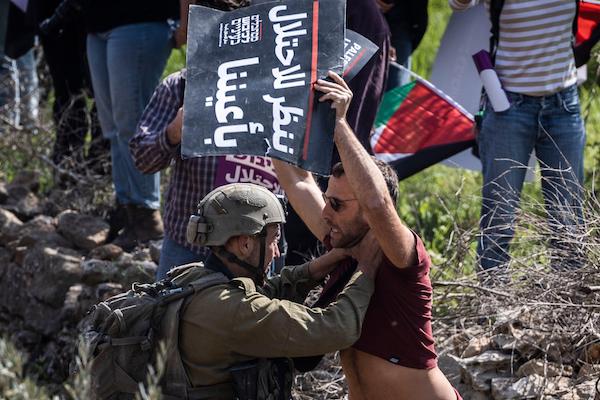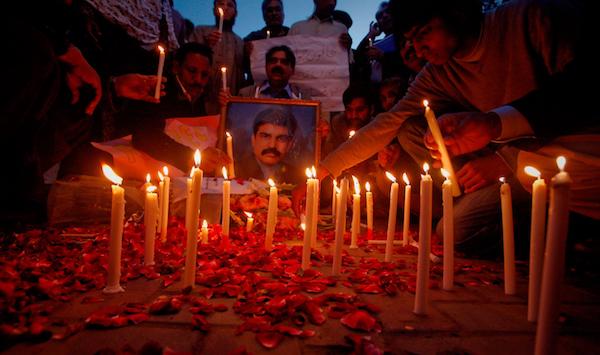Three support networks for Amazon indigenous, including the Catholic Church’s Pan-Amazonian Ecclesial Network, have written to the presidents of the Amazonian countries (Colombia, Brazil, Bolivia, Ecuador, Venezuela, Suriname and Guiana) in support of their plans for a joint Amazon Summit.
In their letter, they underlined the importance of addressing “the loss of biodiversity, the degradation of strategic ecosystems and the increasing impact on the rights of Amazonian peoples, as evidenced, for example, by the killing of activists and the escalation of violence against women”.
They said that “the cry of the forest and its people is getting louder, calling on all social and institutional forces not to remain silent and to act”.
After 46 years, Argentine police have reopened the investigation into the death of Bishop Carlos Ponce de León of San Nicolas de Los Arroyos. Rumours persist that he was killed in 1977 by the country’s dictatorship.
The Federal Court of Appeal of Rosario has annulled the 1978 ruling which classified the death as a road accident. The court said that “it has been demonstrated that Ponce de León was the object of intelligence operations, surveillance and threats by the repressive bodies of the civil-military dictatorship that governed the country”.
The bishop regularly denounced abuses, crimes and human rights violations committed by the dictatorial regime.
Hundreds of students protested in Manila on 1 March, calling for a ban on fraternities in universities and colleges in the Philippines after a student at a Vincentian-run university was found dead after going missing on 18 February.
They blamed the death of 24-year-old John Matthew Salilig on a hazing or initiation ritual that was probably carried out by a fraternity at Adamson University in Manila. “As long as fraternities are allowed in schools and colleges, this senseless violence to be accepted as a ‘brother’ will continue,” said a protestor.
In 2018, the Philippines strengthened a 1995 anti-hazing law, but it remains an accepted practice among student fraternities.
The Minorities Alliance Pakistan has observed candlelight vigils in remembrance of Shahbaz Bhatti, the Catholic federal minister who was assassinated 12 years ago by Taliban gunmen. He was minister for Minorities Affairs for three years before his death on 2 March 2011.
Tributes were paid to his “tireless” struggle and sacrifice for oppressed and marginalised communities. Bhatti, the only Christian in Pakistan’s cabinet, promoted social and interfaith harmony and was a critic of the country’s blasphemy laws. Participants lamented the failure to repeal the blasphemy laws while “the number of falsely accused has increased”.
During Lent, Myanmar’s Catholic communities have been collecting donations for displaced people and those living in poverty in forests, victims of the ongoing civil war. Donations go to Caritas Myanmar, the relief agency of the Burmese bishops’ conference, which provides aid regardless of faith, culture or ethnicity.
Christians in conflict-torn Chin state are facing increasing restrictions on their religious activities, under rules imposed on 2 February. Some churches are required to seek permission to hold Sunday services, and others asked to provide names of priests, lists of churchgoers, and phone numbers of those who attend the services. Over 70 religious buildings in the state, including dozens of churches, have been destroyed since the military seized power in February 2021.
The Patriarch of the Ethiopian Orthodox Tewahedo Church travelled to Tigray on 1 March for the first time since the war in the region ended last November.
The purpose of the day-long trip was to attend a funeral. There was no public discussion of the rift between the Church’s ruling synod and the Tigray Orthodox Church. Upon arrival, Patriarch Abune Mathias I was welcomed by members of the Tigray Church, although only a week ago its bishops rejected the synod’s request for “reconciliation” talks.
They set up their breakaway Church in May 2021, criticising the ruling Synod for its silence while priests were killed, monasteries and churches destroyed, and religious heritages looted during the war.
The president of Timor-Leste, José Ramos-Horta, has appealed to international partners to invest in Church organisations and civil society groups in his country.
He says the government has funds but lacks the personnel necessary to implement its social development programs. “There is no execution capacity,” Horta said during a national meeting for children’s rights in the on 1 March.
Ramos-Horta said he looks to agencies such as UNICEF to work in partnership with Church bodies and others. He particularly urged investment “in rural development to improve the lives of the people.” About 42 percent of the majority-Catholic population lives in poverty.
The newly accredited apostolic nuncio to Seychelles has promised to work on social issues and climate change. Archbishop Tomasz Grysa presented his credentials to President Wavel Ramkalawan on 28 February.
The archbishop said afterwards that among the topics discussed was the country’s huge drug problem. The Church “will cooperate in this field with its experience and expertise as it is very much involved in working with people addicted and also in reacting in a structural way to fight drug trafficking,” he said.
The discussion also touched on climate change and “how Seychelles and the Holy See can cooperate more closely”.
A kidnapped missionary in Haiti escaped last month after ten days of captivity. Fr Antoine Macaire Christian Noah, a Claretian priest from Cameroon, was kidnapped on 7 February while travelling to his community outside Port-au-Prince, and held in an abandoned house, but broke out when his captors left the building.
The Claretian major superior in the Antilles, Fr Fausto Cruz Rosa, told ACI Prensa that Fr Macaire “didn’t feel afraid because he prayed to his patron saint, St Anthony of Padua”, and said that he was willing to return to Haiti.
“The kidnappers were surprised how the priest could endure, because they only gave him food four times in ten days and a little water,” said Fr Cruz.
Pope Francis has highlighted the importance of “humility, gratitude and awe” towards the oceans.
“Our understanding of the complex and amazing mechanisms and balances of the oceans allows us to appreciate the role they play for everyone, not just coastal communities,” he said in a message to the “Our Ocean, Our Connection” conference held in Panama.
This coincided with UN-sponsored breakthrough talks in New York last weekend where over 190 countries agreed to a new “High Seas Treaty” to protect 30 per cent of the world’s oceans by 2030.
Pope Francis described oceans as the “common heritage” of humanity and warned against pollution, acidification, illegal fishing, and deep-sea mining. He welcomed effective “governance systems” to regulate and coordinate conservation.
The Archdiocese of Lumbumbashi in the Democratic Republic of Congo has demanded an explanation from the country’s military for a “raid” on its cathedral and diocesan offices.
In a statement, the archdiocese reported that a convoy of military vehicles had arrived unannounced and men from the Republican Guard – a security unit distinct from the Congolese army – had demanded entry to the office of Archbishop Fulgence Muteba Mugalu.
They were refused, but the Republican Guard maintained that they were there to make preparations for a visit to the cathedral by the president. The archdiocese, however, said that it had not been informed of any visit and suspected “unjustified intimidation” or an attempt to kidnap the archbishop.
French prosecutors have closed a sexual abuse investigation against Cardinal Jean-Pierre Ricard because his self-confessed “reprehensible” treatment of a 14-year-old girl 35 years ago was beyond the statute of limitations.
A separate Vatican investigation into Ricard’s admission, the highest-level case in a long line of clerical sexual abuse scandals, apparently continues. Ricard, who was twice head of the French bishops’ conference, shocked the Church with his admission last November.
The Vatican website still lists him as a member of three important dicasteries. At 78, he is still eligible to participate in a future conclave.
The Vatican has stripped the head of the Brothers of Charity order of his administrative powers, saying Br René Stockman had mishandled finances and made controversial decisions.
Stockman remains in his Rome-based post but a papal commissioner will take over leadership responsibilities until a general chapter elects a new superior general next year, Katholiek Nieuwsblad reported.
With Vatican backing, the Belgian-born Stockman opposed a decision by his original province to allow euthanasia in its psychiatric hospitals. The Vatican stripped those hospitals of their Catholic title in 2020. In the long struggle over euthanasia, the Belgian province accused Stockman of shifting its funds to projects in other provinces.
Cardinals, bishops, theologians and other church leaders gathered at Boston College on 3 and 4 March for an ecclesial gathering focused on synodality. Sponsored by on-campus think tanks at three Jesuit universities, the first iteration of the gathering was held last year at the University of Loyola Chicago.
There were four keynote addresses, from Boston College theology professors Rafael Luciani and Hosffman Ospino, Catholic University of America historian Robin Darling Young, and Bishop Daniel Flores of Brownsville, Texas, who chairs the doctrine committee of the US Conference of Catholic Bishops. Cardinals Sean O’Malley and Donald Wuerl presided and preached at the conference’s Masses.
Archbishop Joseph Naumann of Kansas City and Bishop Thomas Paprocki of Springfield, Illinois, went on EWTN’s The World Over with Raymond Arroyo to criticise Pope Francis’s decision to restrict access to the pre-Vatican II liturgy.
Paprocki complained “you’ve got a prefect in Rome basically making decisions about what’s happening in the local diocese and the local parishes”.
Naumann said: “I think what the Pope was trying initially to correct is, there was an attitude, I think, among some, that there was a superiority [of] the Tridentine Mass, to the Novus Ordo, and I think that was an error. But I don’t think that’s how most people in those communities see things.”
Pope Francis will visit Hungary on 28-30 April, the forty-first apostolic journey of his pontificate. The visit, with the motto “Christ is our future”, will see Francis meet refugees and address the Hungarian authorities and clergy in Budapest.
More than 1.5 million refugees from Ukraine are believed to have travelled through Hungary since the Russian invasion last February.
The Pope and his almoner faced criticism from animal rights groups last month for inviting 200 of Rome’s poor and homeless to the circus.
The papal almoner, Cardinal Konrad Krajewski, took a group of 200 to the Rony Roller circus, which features performances by tame animals, and volunteered to lie on stage while an elephant stepped over him to demonstrate its discipline.
Masslimo Comparotto, of the International Organisation for the Protection of Animals, said that the Pope’s apparent sponsorship of the circus “seems contradictory to his so-called ‘ecological magisterium’”. He said that behind the performance “can be hidden deprivation, mistreatment and suffering”.



 Loading ...
Loading ...